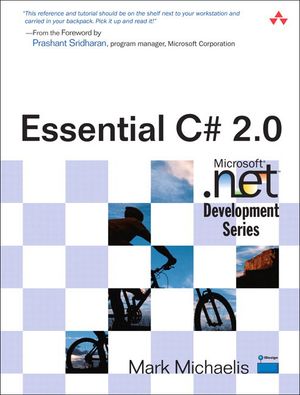Vi har bytt namn till Adlibris Campus! Campusbokhandeln ❤️ Adlibris - Läs mer här

Essential C# 2.0 | 1:a upplagan
- Pocket, Engelska, 2006
- Författare: Mark Michaelis
- Betyg:
Ej i lager
Beskrivning
Hello, World 2
C# Syntax Fundamentals 7
Working with Variables 14
Console Input and Output 18
Comments 22
Common Intermediate Language and ILDASM 25
Chapter 2: Data Types 29Fundamental Numeric Types 30
More Fundamental Types 38
null and void 49
Categories of Types 50
Nullable Modifier 53
Conversions between Data Types 53
Arrays 60
Chapter 3: Operators and Control Flow 77Operators 78
Introducing Flow Control 92
Code Blocks ({}) 99
Scope 101
Boolean Expressions 102
Bitwise Operators (<<, >>, |, &, ^, ~) 108
Control Flow Statements, Continued 113
Jump Statements 124
C# Preprocessor Directives 130
Chapter 4: Methods and Parameters 139Calling a Method 140
Declaring a Method 146
The using Directive 151
Returns and Parameters on Main() 155
Parameters 158
Recursion 166
Method Overloading 169
Basic Error Handling with Exceptions 171
Chapter 5: Classes 185Defining and Instantiating a Class 189
Instance Fields 193
Instance Methods 195
Using the this Keyword 196
Access Modifiers 202
Constructors 204
Static 211
const and readonly Modifiers 218
Properties 220
Nested Classes 232
Partial Classes 234
Chapter 6: Inheritance 237Derivation 238
Overriding the Base Class 250
Abstract Classes 263
Everything Ultimately Derives from System.Object 268
Verifying the Underlying Type with the is Operator 270
Conversion Using the as Operator 271
Chapter 7: Interfaces 273Introducing Interfaces 274
Polymorphism through Interfaces 275
Interface Implementation 279
Casting between the Implementing Class and Its Interfaces 284
Interface Inheritance 285
Multiple Interface Inheritance 287
Implementing Multiple Inheritance via Interfaces 288
Versioning 291
Interfaces Compared with Classes 293
Chapter 8: Value Types 297Structs 298
Boxing 305
Enums 311
Chapter 9: Well-Formed Types 323Overriding object Members 323
Operator Overloading 334
Referencing Other Assemblies 341
Defining Namespaces 346
XML Comments 349
Garbage Collection 353
Resource Cleanup 356
Chapter 10: Exception Handling 365Multiple Exception Types 365
Catching Exceptions 367
General Catch Block 368
Guidelines for Exception Handling 371
Defining Custom Exceptions 373
Chapter 11: Generics 379C# without Generics 380
Introducing Generic Types 385
Constraints 396
Generic Methods 409
Generic Internals 413
Chapter 12: Collections 419Primary Collection Classes 420
Introducing Collection Class Interfaces 433
Providing an Index Operator 444
Returning Null or an Empty Collection 448
Iterators 448
Chapter 13: Delegates and Events 465Method Pointers 466
Multicast Delegates and the Observer Pattern 482
Events 496
Chapter 14: Reflection and Attributes 509Reflection 510
Attributes 520
Chapter 15: Multithreading 549Running and Controlling a Separate Thread 552
Passing Parameters to Threads 557
Thread Pooling 561
Unhandled Exceptions 563
Synchronization 565
Timers 584
Chapter 16: Multithreading Patterns 591Asynchronous Results Pattern 592
Background Worker Pattern 606
Windows Forms 611
Chapter 17: Platform Interoperability and Unsafe Code 615Platform Invoke 616
Pointers and Addresses 630
Chapter 18: The Common Language Infrastructure 641Defining the Common Language Infrastructure (CLI) 642
CLI Implementations 643
C# Compilation to Machine Code 644
Runtime 647
Application Domains 652
Assemblies, Manifests, and Modules 653
Common Intermediate Language (CIL) 656
Common Type System (CTS) 656
Common Language Specification (CLS) 657
Base Class Library (BCL) 658
Metadata 658
Appendix A: Downloading and Installing the C# Compiler and the CLI Platform 663Appendix B: Complete Source Code Listings 667Appendix C: C# 2.0 Topics 693Index 697